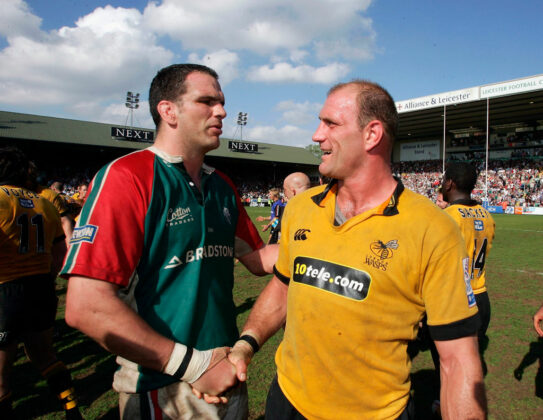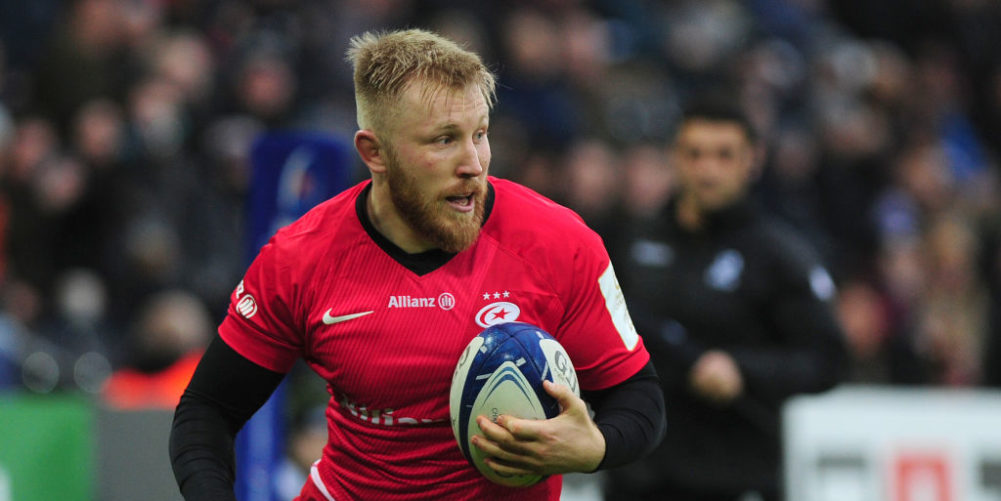Jackson Wray has just agreed fresh terms with Saracens – the clearest possible signal that the most criminally under-celebrated forward in the entire country intends to stay with the shop-soiled champions until they carry him out of the dressing-room door in a box.
Can we get away with calling it a Wray of sunshine in a dark place? It is easy to think of one individual with the same surname who would agree with the sentiment.
Bog-standard contract extensions are seldom worthy of special mention, but one-club men like Wray are not only the heartbeat of club rugby, but also the artery through which the lifeblood flows. As such, due attention should be paid.
No one in possession of their full range of faculties would question the commitment of Owen Farrell or Jamie George to the Saracens project, but when the headline acts are off doing other things in the white shirts of England or the red ones of the Lions, it is the supporting cast who take the load. Wray shoulders as much of that burden as anyone and far more than most. He is an absolute star.
Professional players switch employers far more often than their amateur forerunners did, to the point where it has become a habit rather than a necessity.
But is stickability really less of a virtue now than it was back in the day? Agents would argue that it no longer means a thing, but they would, wouldn't they? Most of the rest of us still have a love of loyalty.
Of the three most influential club performers in the modern era of the English game – Stuart Barnes, Lawrence Dallaglio, Martin Johnson – only the “Bath Barrel” played serious rugby for more than one outfit.
Even now, the best part of 40 years on, Bristolians find it impossible to forgive Barnes for relocating a dozen miles down the road at a transformative point in West Country union relations, hence the continuing references to “Judas” and “Stuart Iscariot”.
Yet he was perfectly within his rights to seek out an environment that truly challenged him.
Once he found it at the Recreation Ground, he gave everything of himself to the cause and never once considered another move.
Such was his centrality to what Bath achieved during their trophy-laden golden decade – his tastes of defeat in all that time barely reached double figures – Barnes is now widely assumed to have been a one-club man, even though he wasn't.
Johnson's wanderlust did not extend further than the Welford Road dead ball area and he duly spent a rugby lifetime as the iron symbol of Leicester's rugged approach to oval ball affairs while ensuring that a soft-centred England team profited handsomely by embracing the same philosophy.
Dallaglio, meanwhile, had the Wasps the captaincy thrust upon him at the dawning of the professional era, yet showed the strength of character to reshape the club in his own exuberant image.
Many of his elders and betters had found Sir John Hall's millions at Newcastle a more attractive proposition than an empty bank account in Sudbury (funny, that) and hot-footed it north, leaving the youngster from Shepherd's Bush to work things out for himself.
So began one of the great “I'm staying put” careers in the annals of the English game.
During his time there, Wasps out-performed their own indicators on budgets, facilities and depth of squad as though it were the most natural thing in the world.
Wray is not one of the titans. He has never won a Test cap and now that he is within touching distance of his 30th birthday, he probably never will.
But with more than 200 senior club appearances in the bank – Dallaglio finished on 227 – it is not difficult to understand why he commands similar levels of respect from the men who play alongside him every week, not to mention the stellar brigade who do so only when the Twickenham grandees say they can.

The Premiership has an excellent cast list of uncapped stalwarts who have shifted heaven and earth on behalf of their teams without receiving a zillionth of the coverage lavished on Maro Itoje, to take the most obvious current example.
Gareth Steenson at Exeter springs immediately to mind.
But when an individual works his way through an academy, breaks into first-team rugby and stays in the trenches for the duration despite the recruitment of big-name imports, as Wray has done, it provides incontrovertible proof that there are things to admire in the domestic structure, as well as things to criticise.
“I go to work every day enjoying what I'm doing, testing myself, always feeling that what I do is appreciated,” he said after putting pen to paper. “It's just a great place to be and a no-brainer to stay.”
There speaks a giant of club rugby, albeit one built on a recognisably human scale.

























